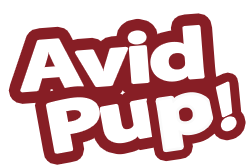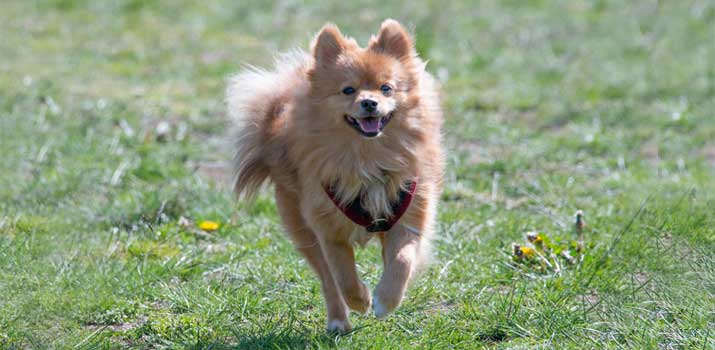
Pomeranians are one of the most popular small dog breeds around. The smallest of the Spitz, these dogs are fiercely loyal to their owners and love nothing more than to play.
They’re also fantastic lapdogs. Despite their high energy levels, these pups will curl up with you on the couch all the same.
One of the best things you can do to keep your Pomeranian happy and healthy is to provide a high-quality diet.
For any breed, the quality of dog food you provide is going to impact on their health. It’s their prime source of essential nutrients.
For small breeds like the Pomeranian, high quality nutrition is crucial.
In terms of volume, Pomeranians don’t eat a ton of food. So, every bite has to count! You must invest in nutritionally dense foods that cover all of your pup’s basic needs.
Not only that, but these dogs need to have a formula that’s specifically created for small breeds. Standard recipes just won’t do.
Luckily, there are plenty of great foods on the market for you to choose from.
To help you zero in on the right one for your furry friend, we’ve curated a list of some of the best dog foods for Pomeranians that money can buy. Check out our top picks below!
7 of the Best Dog Foods for Pomeranians
1. Wellness CORE Grain-Free Small Breed Turkey & Chicken Recipe Dry Dog Food
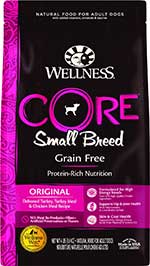
Give your Pomeranian a food that works for their biological needs. This recipe from Wellness Core is specifically made for small breeds. It has high-quality protein to support your bundle of energy!
In total, the recipe is made up of 36 percent protein! Most of it comes from deboned turkey, turkey meal, and chicken meal.
The formula also has a generous amount of fat. The fat comes in the form of salmon oil, which is chock-full of those healthy omega fatty acids.
You’ll also find a great blend of fruits and vegetables. There’s broccoli, carrots, apples, blueberries, and so much more.
The plant-based ingredients provide plenty of vitamins, minerals, and antioxidants.
2. Castor & Pollux Organic Small Breed Recipe Grain-Free Dry Dog Food
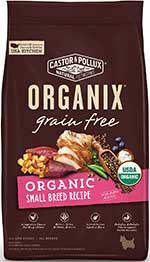
The ORGANIX food from Castor and Pollux provides the very best for your furry friend. It’s one of only a few USDA certified organic dog food products on the market.
Each ingredient is free of GMOs or artificial preservatives. This ensures that your dog is getting all the nutrition they need.
This particular formula is boasting 26 percent protein and 15 percent fat. It also has omega fatty acids, glucosamine, and chondroitin.
The recipe contains some great superfoods as well. Ingredients like flaxseed, coconut oil, and blueberries provide a boost of healthy antioxidants to fight off free radicals.
To round everything off, Castor and Pollux added probiotics and prebiotics to improve digestive health.
3. Hill’s Science Diet Adult Small Paws Chicken Meal & Rice Recipe
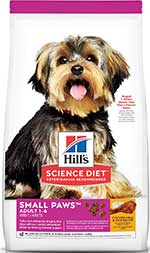
Made for small mouths and energetic attitudes, this Hill’s Science recipe is great for Pomeranians.
It’s specifically formulated to meet the nutritional needs of small and toy breeds under 25 pounds.
You won’t find any artificial flavors, colors, or preservatives. Instead, you’re getting ingredients that support your dog’s bones and muscles. The recipe has a good amount of protein and calcium.
There’s also a blend of antioxidants to support the immune system and fight off free radicals.
Pair that with the omega fatty acids from the flaxseed and you have a well-rounded formula that your pooch with love!
4. Merrick Classic Healthy Grains Small Breed Recipe Adult Dry Dog Food
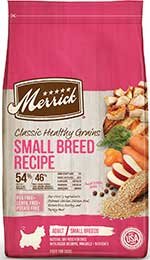
Here’s a dog food product that puts premium proteins and high-quality grains at the forefront. About 27 percent of the formula is protein.
You’ll find ingredients like deboned chicken, turkey meal, and salmon meal.
This recipe uses some unique grains to improve digestive health. Rather than unnecessary fillers, Merrick uses a blend of brown rice, quinoa, barley, oatmeal, flaxseed, and more.
The grains provide a great source of vitamins and minerals while also supporting your pup’s digestive system.
There’s a nice collection of plant-based ingredients as well.
Apples, carrots, and alfalfa meal that much-needed boost of nutrients. Meanwhile, a healthy dose of omega fatty acids, glucosamine, and chondroitin keep the joints in good shape.
5. FirstMate Small Bites Australian Lamb Meal Formula Limited Ingredient Diet
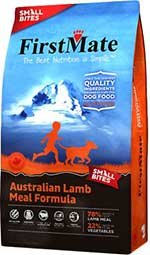
Have a dog that suffers from allergies? This small-breed dog formula is a good choice. It contains a unique protein source compared to other recipes.
Most of the protein comes from lamb meal, which can address allergies with more common sources.
Overall, the formula has fewer ingredients than you might be used to. It’s a limited recipe that still manages to cover all the basics.
The kibble is free of grain and gluten. But, it has a nice blend of berries for a source of antioxidants.
The individual kibble pieces are small and manageable for your Pomeranian, too.
Best for Puppies
6. Blue Buffalo Life Protection Formula Small Breed Puppy Chicken & Oatmeal Recipe Dry Dog Food
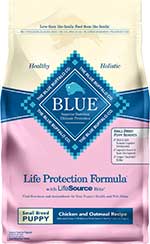
Get your Pomeranian puppy started on the right dietary journey with this recipe from Blue Buffalo.
It has all of the same great features as the brand’s adult line.
The food is packed with high-quality protein from chicken and fish. It also has the signature LifeSource Bits, which are filled with antioxidant-rich fruits and vegetables.
Puppies benefit from this food because it has more protein and higher fat content. It also has an appropriate level of calcium and phosphorus, which are crucial for proper bone development.
The ingredients also provide DHA and ARA for brain and eye health.
Best Canned Dog Food Option
7. American Journey Stews Poultry & Beef Variety Pack Grain-Free Canned Dog Food
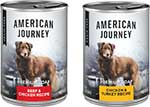
This grain-free canned food has a lot to offer Pomeranians. Whether you have a picky eater or an older dog with dental problems, the soft formula is easy to eat and packed with flavor.
Real high-quality meats and broths are used to give the food its texture. This particular package comes with two different flavors.
One uses meat as the primary protein source while the other uses chicken.
Both are filled with beneficial amino acids to support your dog’s muscles. Meanwhile, vegetables like peas, potatoes, and carrots give your dog the vitamins and minerals they need to thrive.
Special Food Considerations for Pomeranians
For the most part, Pomeranians are pretty healthy dogs. The breed has been around since the 16th century. Throughout its history, breeders have done a lot to manage genetics and avoid major health risks.
As long as they come from a reputable breeder, the Pomeranian pups we know today are very hardy. In fact, they can live up to 16 years with good care!
All that said, no dog is immune to poor health.
Many of the potential health issues that Pomeranians can experience are tied to their size. Adults only weigh between three and seven pounds when fully grown.
With that small stature comes some unique needs when it comes to food.
Small Kibble Size
Have you ever seen a tiny dog like the Pomeranian try to eat large food? They’re not exactly the most graceful!
You’ll need to stick with small dog food products with manageable kibble sizes. Not only does is make things easier, but small kibble pieces can make eating safer.
Your Pomeranian teeth are much more delicate than that of a Bull Mastiff! While they can certainly still do some damage, your dog’s going to have a harder time chewing larger chunks of food.
Their smaller teeth and weaker jaws make it tough. This could lead to some choking hazards.
Many small breeds have a higher risk of dental problems. Pomeranians are no exception.
Smaller morsels of food can scrub the teeth clean while also lowering the risks of cracks and pain.
Controlled Calories
Ideally, adult Pomeranians should eat about 40 calories of food per pound of body weight.
That’s a good general guideline, but your dog may be different. You will need to make adjustments based on their physical activity and lifestyle.
Very active adults and growing puppies may need upwards of 55 calories per pound while seniors may only need about 30.
It’s important to consult with your vet about food quantities. You’ll also need to keep an eye on their weight.
Pomeranians are notorious for packing on the pounds if given the opportunity.
Keep tabs over what your dog eats! Avoid free-feeding and measure out every meal to ensure that your dog’s health doesn’t suffer.
Feeding Frequency
There’s a good chance that your Pomeranian is a bundle of energy!
That’s because these dogs have very high metabolism levels. They burn through the food they eat pretty quickly!
To keep their energy levels stable, you must manage meals accordingly. Larger dogs can store energy from one meal to last the day. Small dogs don’t have that ability.
Puppies will need their daily caloric intake split up into three to five meals every day.
Adults will need two or three meals. Splitting up their food into multiple meals can keep your pooch’s energy levels stable all day long.
Food Sensitivities
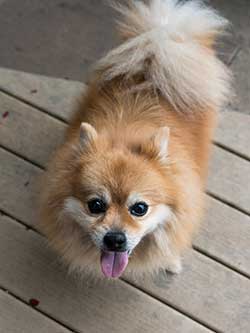
Pomeranians are known to suffer from food allergies. They have somewhat sensitive stomachs that may react negatively to certain food ingredients.
If your dog is constantly suffering from diarrhea, don’t ignore it! Chances are, there’s something in their food that their body isn’t agreeing with.
Some of the worst offenders are filler ingredients like corn, soy, and wheat.
We’ll get into this more in a bit, but these ingredients don’t provide any nutritional value. Canines often have trouble processing them, resulting in some stomach issues.
Stick to a filler-free formula with only beneficial ingredients. If your dog suffers from some other kind of allergy, consult with your vet.
You may need to look for limited-ingredient products.
Potential Health Issues
There are a few health problems you have to be wary of. As we mentioned earlier,
Pomeranians are quite healthy. But, their small size does put them at risk for some common health disorders.
Food alone won’t stop a disease from happening. However, a good diet can lower your pup’s risks and address symptoms.
Ocular Conditions
There are a couple of eye diseases that Pomeranians can suffer from.
The first is cataracts. This condition tends to start affecting dogs as they approach their senior years.
It causes the eyes to become cloudy, which could affect vision. Foods that are high in beta carotene can promote better ocular health.
Another common issue is distichiasis.
One of the few congenital disorders Pomeranians can suffer from, this disease causes the eyelashes to grow inward and potentially damage the eyeball.
Joint Problems
Many small dog breeds can experience patellar luxation. This disease affects the knee joint. The bones in the hind legs can become malformed, causing alignment issues.
As a result, the kneecap can get pushed out of position, causing some immense pain for your pup.
Hypoglycemia
This is a manageable issue that many Pomeranians experience.
Essentially, it’s when blood sugar levels fall to the point that your dog has no more energy! It happens when your dog’s fast metabolism drains energy too fast.
In severe cases, dogs can pass out or die.
Luckily, you can prevent hypoglycemia by splitting up meals as we talked about earlier.
Choosing the Right Dog Food for Your Pomeranian
Finding a suitable dog food is all about analyzing the ingredient’s list. It’s not enough to rely on marketing gimmicks and health claims.
To know for sure that the product you choose is a healthy option, you must take a look at what the food contains. Here are some important things to look for.
High-Quality Proteins
At the very top of the ingredients list, you should see a high-quality protein. Protein is the most important macronutrient any dog needs to survive.
Canines thrive on protein, as it contains amino acids that built and maintain muscle.
According to AAFCO guidelines, Pomeranians need at least 18 percent protein. However, you can go higher.
Many top-tier dog food brands contain over 30 percent protein.
Stick to wholesome meat ingredients like chicken, beef, fish, lamb, and anything else that’s identifiable.
Meat meals work well, too. However, you should avoid any byproducts or mystery meats that don’t identify what animal the protein comes from.
Healthy Fats
Contrary to popular belief, you should not avoid fat when shopping for dog food.
Fat is a valuable source of energy. Not only that, but it provides natural flavoring and supports soft tissue throughout the body.
Adult Pomeranians need at least 5 percent fat in their food. Puppies will need at least 8 percent.
Natural fat sources from the protein are best.
You can also go for foods with salmon oil or flaxseed oil. Those fats contain omega fatty acids, which can support your dog’s skin and coat. The fatty acids can also promote good heart health.
Complex Carbohydrates
Carbohydrates act as a source of energy. But, not all carbs are made equal. Many cheaper products utilize empty fillers for carbs, such as corn, wheat, or soy.
Those carbohydrates break down quickly, which can lead to the aforementioned hypoglycemia issues.
Complex carbs are absorbed slowly throughout the day to help regulate your dog’s energy levels.
Good sources of complex carbs include sweet potatoes, peas, brown rice, legumes, and more.
Micronutrients
Micronutrients, such as vitamins and minerals, are always a plus! Nutrient-rich foods can support your dog’s overall health.
Dog food manufacturers typically provide macronutrients through plant-based ingredients like fruits and vegetables. Look out for leafy greens and antioxidant-rich fruits for the best results.
You can also find foods with beneficial supplements like glucosamine and chondroitin. They can help with joint health.
Digestive Support
Finally, it pays to provide food with probiotics.
Probiotics are beneficial gut bacteria. When added to food, the bacteria will support the digestive system and help process food more efficiently.
This can help avoid stomach upsets and keep your dog more regular.
Conclusion
With the best dog food for Pomeranians, your energetic ball of fluff can live a long and healthy life.
Top-notch food products will fulfill your dog’s nutritional needs while supporting all of their biological functions.
Don’t skimp out on your dog’s food! Take some extra time to choose one that’s healthy and tasty. Your dog will love you for it!
Also Read: What if Your Dog Won’t Eat, But Wont Say No to Treats?

